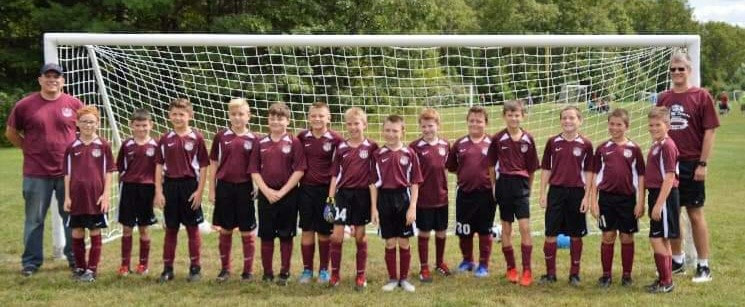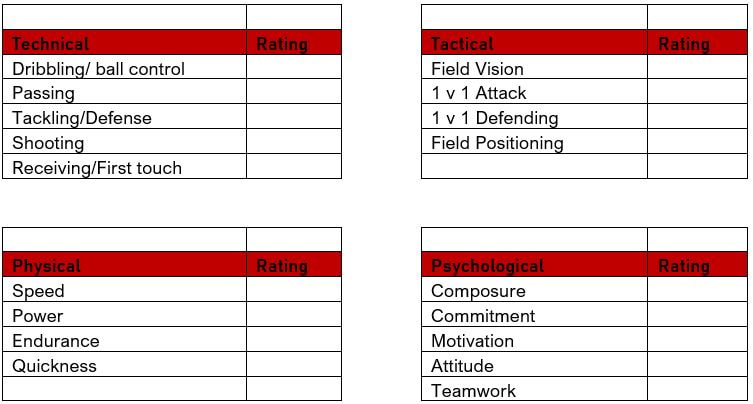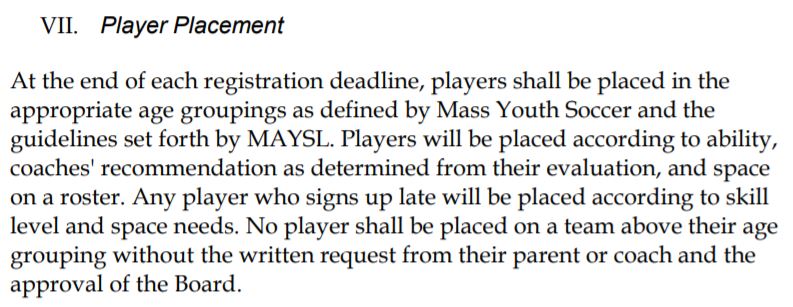Key Objectives for the U12 NYSA Program · Have fun (players, coaches and parents)
For most U12 players:
- Players should be sharing the ball at this point
- Focus on intermediate skill & intermediate tactics
- Individual, pairs and small group activities up to 4-6 players
For most U12 players:
- Are playing on a much bigger field
- Have a positional understanding
- Will have no clue what the offside rule is, parents included, be patient
- Will physically be challenged by the larger field, sub often
- 1. Maturing at different rates
- 2. Players need to warm-up and stretch, cooldown
- 3. Players will typically understand hypothetical situations
- 4. They like to solve problems, encourage them to provide the answers
- 5. Peer evaluation is a constant, social status
- 6. Egos are sensitive, coach appropriately to each individual
- 7. Coordination may depend on growth spurt rate
- 8. Technique still needs to be reinforced and practiced
- 9. Playing too much can lead to injuries
- 10. Keep asking the players to be creative and to take risks, make their own decisions
- 11. Ask for feedback
Player Development Skills:
Goalkeeping - Technical Skills:
COACHING TIPS FOR U12:
Allow the players to make mistakes and encourage them to make their own decisions. As players progress to U10, they play on larger fields and dribbling may not always be the best option in their minds. Players will need to start understanding when to dribble, when to pass, and when to shoot. They will often choose the wrong option, but as coaches and parents, we need to be patient with them and encourage them to make these decisions independently, especially during games.
Aimless kicking or “booting” of the ball should not be encouraged
The players are aware of the score and many parents and coaches are paying more attention to the results. You will start noticing many coaches and parents yelling directions from the sidelines. We should remind ourselves and the parents of our players that improving their play is the main objectives. We should refrain from yelling directions to the players during games, as it will hamper their ability to make decisions independently and learn from the results.
Reduce player dependence on adult guidance through “Guided Discovery”
In practice sessions, coaches should try to allow players to make mistakes and ask players how they could do things better and guide them to the correct answers, rather than telling the players what to do. This will help the players’ ability to solve problems and reduce their dependence on adults for guidance during games.
- Dribble with all sides of both feet (inside, outside, sole, laces)
- Dribble out of trouble · Dribble past someone · Changes of direction
- Speed dribbling in traffic
- Soft first touch-first touch away from pressure
- Receiving the ball with all parts of the body
- Shielding – proper technique to shield the balls from opponents
- Shooting with both feet (with inside of foot and laces) -Shooting for power and accuracy
- Passing with inside and outside of both feet - Passing to feet and passing to space
- Introduce chipping the ball
- Introduce long passes
- Different throw-in techniques
- Proper defending techniques
- Juggling with both feet and body
Goalkeeping - Technical Skills:
- Proper positioning
- Body position around the goal
- Ball distribution (throwing, rolling, punting)
- Basic diving from the ready position
- Collecting balls from the attacking player’s feet
COACHING TIPS FOR U12:
Allow the players to make mistakes and encourage them to make their own decisions. As players progress to U10, they play on larger fields and dribbling may not always be the best option in their minds. Players will need to start understanding when to dribble, when to pass, and when to shoot. They will often choose the wrong option, but as coaches and parents, we need to be patient with them and encourage them to make these decisions independently, especially during games.
Aimless kicking or “booting” of the ball should not be encouraged
The players are aware of the score and many parents and coaches are paying more attention to the results. You will start noticing many coaches and parents yelling directions from the sidelines. We should remind ourselves and the parents of our players that improving their play is the main objectives. We should refrain from yelling directions to the players during games, as it will hamper their ability to make decisions independently and learn from the results.
Reduce player dependence on adult guidance through “Guided Discovery”
In practice sessions, coaches should try to allow players to make mistakes and ask players how they could do things better and guide them to the correct answers, rather than telling the players what to do. This will help the players’ ability to solve problems and reduce their dependence on adults for guidance during games.


